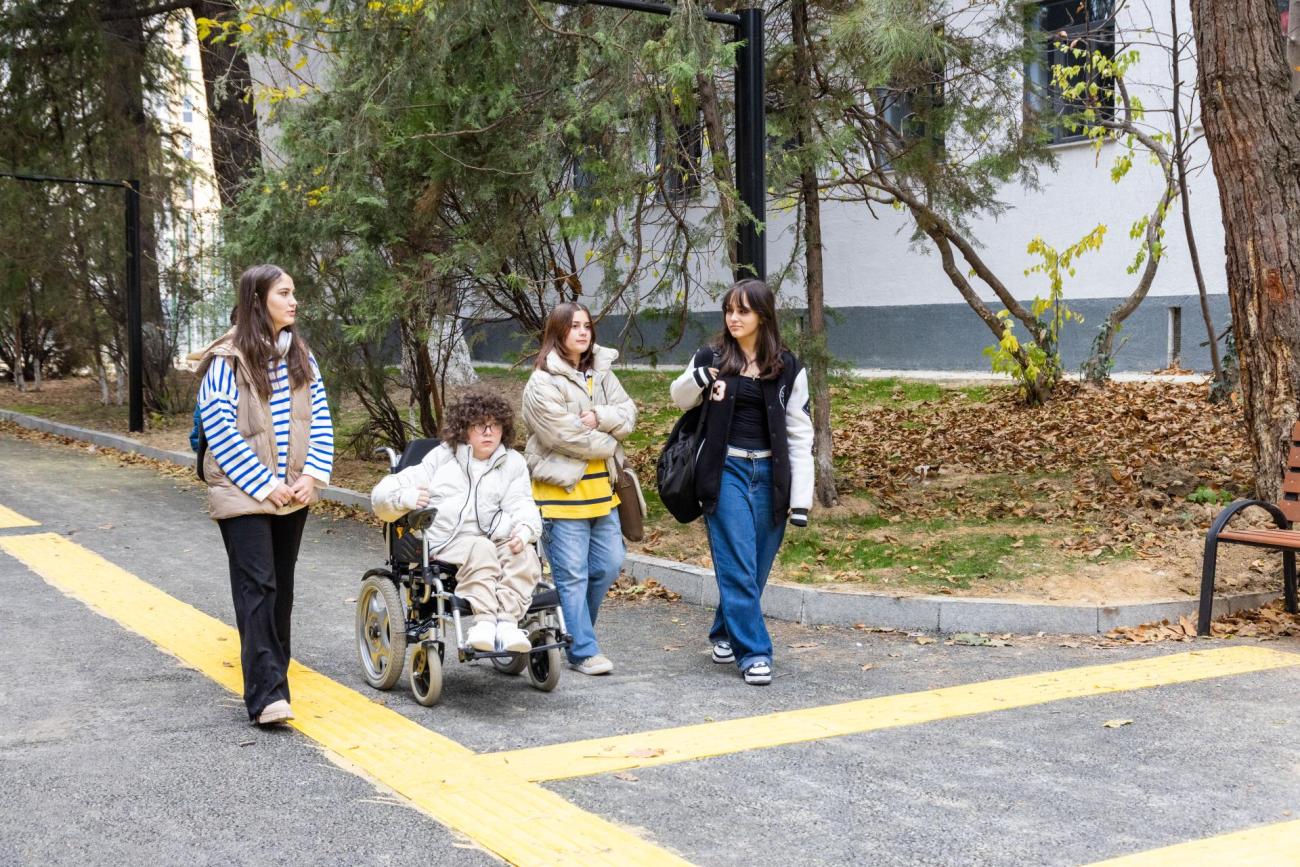“This is an identical copy of the moon. This is Newton's pendulum, and what we see is the galaxy flying in the magnetic field,” explains Bacho, 15, showing off his collection of miniature galaxy figures. Since the young age, Bacho has been interested and passionate about physics.
“My goal for the future is to become a physics theoretician. I want to receive a full scholarship from California Technical University in Los Angeles, where they teach theoretical physics the best,” he says.
Bacho lives in Tbilisi, Georgia with his parents and a younger brother – Alex. He spends most of his days at home, doing homework and learning as much as he can about his topics of interests via digital resources. He says, he would like to go spend more time outside, but what prevents him is his disability – Bacho has spinal muscular atrophy and moves around in an electronic wheelchair.

UNICEF/Geo-2022/Sukhitashvili
Children with disabilities are one of the most vulnerable groups in Georgia. The services for children with disabilities in Georgia remain insufficient. In many municipalities such services do not exist at all.
The widespread misconceptions and false beliefs prevent them from full engagement in social, educational, and cultural activities and from realizing their rights. Children with disabilities continue to suffer from the strong stigma connected to disability.
“I have faced stereotypes too many times in my life. I think, this is because there is no information out there about us -people with disabilities. For example, if a person has a certain disability, everyone assumes right away that this person is not capable to think,” says Bacho.
“When I first went to school, none of the teachers thought I could do anything. They assumed that my mom was doing my homework, not me. When I heard about this, I felt very upset, it made me feel like no one believed in me at school. Soon I proved them wrong – I am one of the few straight A students in my class,” smiles Bacho.
In 2021 UNICEF invited Bacho to act as an advisory committee member in the project aimed at transforming disability assessment and support system in Georgia. “I was surprised how considered my input and opinions. I was listened to exactly the same way that adult professionals were listened to,” remembers Bacho. The focus of the Programme was to improve the policy environment, advance the accessibility of infrastructure, information and services, promote social inclusion, and increase access to social services for people with disabilities in Georgia.

UNICEF/Geo-2022/Blagonravova
Bacho has not physically attended school since he was in the third grade. The school is not far from his home, however, travelling this road can be a grueling task for Bacho and his mother. From the elevator to the ground floor there is a flight of stairs without a ramp, sidewalks are too narrow, there are several places on the way where Ana, Bacho’s mother has to lift the wheelchair to move forward.
Ana says, the main problem was that even once they made it to school, she had trouble getting Bacho inside the building, then on the 2nd floor to his classroom. The building had no ramps, no bathroom adapted for wheelchair access, no elevator. Ana was helped by older students to carry Bacho around, which became almost impossible once the boy grew older and heavier.
“It is ironic that it was COVID-19 pandemic that helped Bacho,” says Ana. “Online classes were introduced and for 2 years Bacho was able to attend classes, catch up with his classmates, learn in an interactive way”.
Bacho was the first child in a wheelchair that attended the Tbilisi public school #169. Ana says, the school director and the teachers have always tried their best to help Bacho stay up to date with the curriculum, regularly sending him class notes and giving feedback for his homework. However, it was only recently that the school underwent a physical remodeling, with disability access in mind.
“This makes it possible for Bacho to attend his school again and we are going to use this opportunity,” says Ana. “Even though it will take us one hour to get to the school, instead of 15 minutes – like for everyone else”, she adds.
Limited access to services, stigma and social exclusion are far too often a reality for the children with disabilities.
“From a very young age, I have known that I am different from others. But I never saw this as a problem, because I believe that all people are equal and yet, unique,” says Bacho. “It is only the outside barriers, created by humans themselves, that create problems.”
“It is very important that such barriers no longer exist, says Bacho. “It is important not only for people with disabilities, but for the whole society.”


